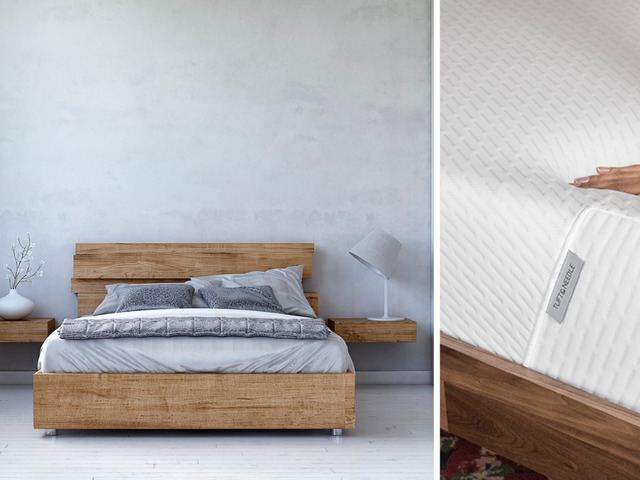
While some may be able to fall asleep on a stone bench without blinking, others need a very thick but soft mattress to be able to sleep. There is no “best” mattress, and studies by bedding professionals have shown that a person feels more or less comfortable on one or the other depending on their weight. To help you choose what’s best for you, several criteria have been compared.
A CHOICE ACCORDING TO YOUR BODY SIZE
There are many rumours on the subject: for example, it is regularly said that people with back problems should opt for a hard mattress. In reality, this depends mainly on the size of the body: a heavy person will have to choose a firmer mattress in order to keep his or her spine straight. On the other hand, a light person will feel better in a soft mattress and be exposed to less muscle tension.
Weight should always be considered in relation to height: a person who weighs 80 kilos but is 1.90 metres tall will opt for a soft mattress when another person of the same weight who is 1.60 metres tall will choose a firmer mattress.
…BUT NOT ONLY THAT!
However, stoutness should not be the only criterion for selecting a mattress. Both firm and soft mattresses have advantages and disadvantages. For example, a person who moves around a lot during the night may feel more constricted on a mattress that is too soft because it is difficult to turn over, which will cause him or her to wake up frequently.
Conversely, on a mattress that is too firm, the sleeper is poorly supported and it is certain parts of the body that are responsible for the entire body weight: generally the lower back and shoulders. Several nights of this kind can lead to varying degrees of back pain. Above and beyond your height and weight, you should therefore be aware of your sleeper profile and any possible weaknesses in your back.

MATERIAL, SUSPENSION… OTHER CRITERIA ARE ALSO TAKEN INTO ACCOUNT.
A person who sleeps alone will not have the same requirements as a person who shares a bed with a partner. Thus, for couples with very different body sizes, it is possible to adjust the range by also opting for a mattress topper: this object, which is placed above the mattress, adapts to the body size of each person by filling in the gaps between the mattress and the body.
The weight distribution is thus homogenized. In addition, beyond the firm or soft aspect, it is important to observe two criteria. Firstly, the filling: the firmness of the mattress will last more or less long depending on its material (natural or synthetic latex, foam, springs, water…). Secondly, the suspension, because this is what will determine the level of comfort of a mattress, read my review here.
Often neglected, pillows also have an importance on the quality of your sleep. After choosing your mattress and box spring, choose a quality pillow, more or less firm (depending on your level of comfort). Ideally, your body should return to the same position horizontally as it does vertically. This is the best guarantee of comfort.
Choose a firm pillow if you sleep on your side, softer if you sleep on your back and very soft if you like to sleep on your stomach. Also remember that all pillows, even feather pillows, are machine washable. Once they are clean, put them in the dryer on a lukewarm setting. To keep your pillows fluffy, put a tennis ball in your dryer.
If you feel the springs in your mattress, if it doesn’t return to its original shape quickly when you get up or if it digs in the middle, replace your diaper. Also remember that a firm mattress is as bad for your back as a soft one. Don’t hesitate to take off your shoes and lie down on the mattress, even in stores.
Assess all positions as if you were asleep. Forget your natural shyness. Choosing a mattress blindly will not necessarily ensure the comfort you want. Good night!


